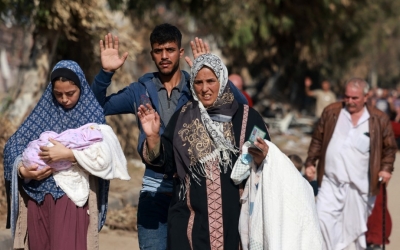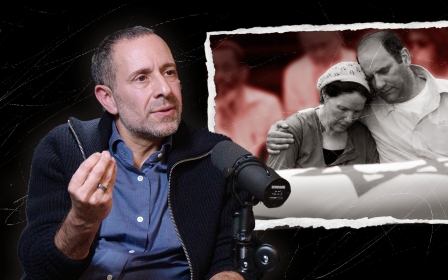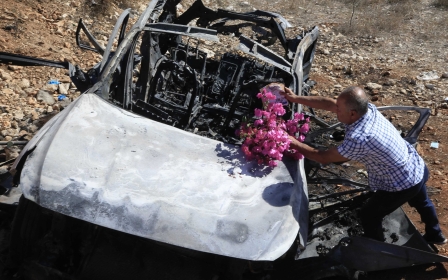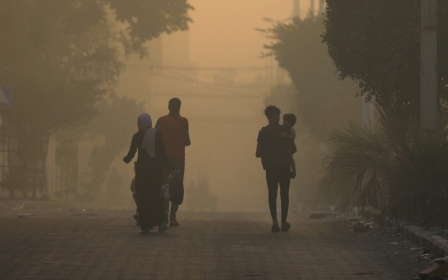Israel-Palestine war: Deal on Gaza truce 'close' as Israeli strike kills Lebanese journalists
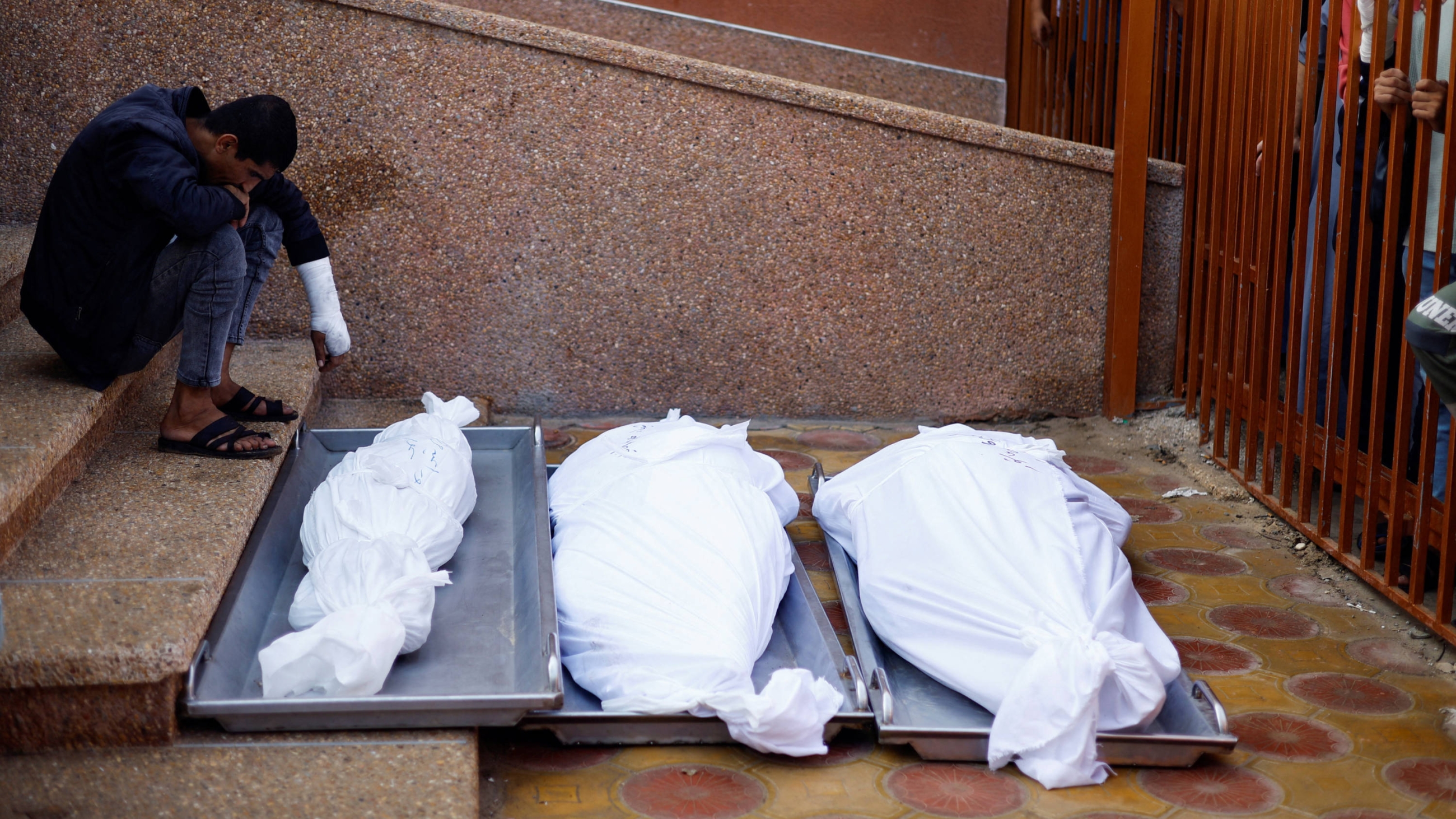
Israeli Prime Minister Benjamin Netanyahu said on Tuesday that "progress" has been made on the release of some of the captives held in Gaza, while Hamas indicated that a truce with Israel was close, as the war enters its seventh week.
Hamas officials were "close to reaching a truce agreement" with Israel and the movement has delivered its response to Qatari mediators, Hamas leader Ismail Haniyeh said in a statement sent to Reuters by his aide, while Qatari mediators said a deal to pause the fighting was imminent.
Negotiations have centred on how long the truce would last, aid delivery into Gaza, and details of the exchange of captives and Palestinian prisoners, according to a Hamas official, speaking to Al Jazeera.
Around 240 people were taken captive on 7 October, when Hamas led a surprise attack on southern Israeli towns, killing 1,200 Israelis.
Since then, Israel has launched a brutal bombing campaign and ground invasion of the Gaza Strip, wreaking destruction across much of the besieged enclave, especially its north, and killing at least 13,300 Palestinians, including at least 5,600 children.
New MEE newsletter: Jerusalem Dispatch
Sign up to get the latest insights and analysis on Israel-Palestine, alongside Turkey Unpacked and other MEE newsletters
"We are making progress. I don't think it's worth saying too much… but I hope there will be good news soon," Netanyahu told Israeli soldiers at a military base in the north of the country.
Meanwhile, at a virtual Brics summit on Tuesday, Saudi Crown Prince Mohammed bin Salman said all countries should stop exporting arms to Israel.
The crown prince said his country demands the start of a serious and comprehensive peace process to establish a Palestinian state along the borders of 1967.
'A cemetery, not a hospital'
While there have been several reports of an imminent deal for days, the Israeli campaign on the Gaza Strip has not relented.
At least 20 Palestinians were killed in Israeli strikes on the crowded Nuseirat refugee camp in central Gaza, the Palestinian health ministry said. A huge number of Palestinians fleeing Gaza's north, on the orders of the Israeli military, have sought refuge in the camp.
For weeks, Israel has threatened northern residents to relocate south for "safety" or risk getting bombed themselves. However, according to the UN, some 160,000 people have opted to remain in the north, as nowhere is deemed safe in the Strip.
Follow Middle East Eye's live coverage of the Israel-Palestine war
The army has recently intensified its bombing in the south, and is ordering civilians to relocate, once more, leaving them in fear of having no safe areas to go to.
"Continued bombing targeting displaced people in the South has a clear objective, and that is to force Gaza's residents to leave the Strip," Egypt's foreign ministry spokesman said on X, formerly Twitter.
"Egypt has clearly declared its utter rejection of any enforced displacement attempt of Palestinians."
Around three-quarters of Gaza's population, some 1.7 million people, have been displaced since 7 October, with many seeking refuge in UN-run schools and in hospitals.
However, the Israeli army has bombed hospitals, schools, mosques, churches and other civilian structures. In northern Gaza, all hospitals are now totally out of service, the health ministry said, with many still housing patients and displaced people.
“There are no medical services or help to anyone in north Gaza now,” Ashraf al-Qudra, a ministry spokesperson said on Tuesday.
The World Health Organisation (WHO) said it was working on plans to evacuate three northern Gaza hospitals: al-Shifa, al-Ahli and the Indonesian Hospital.
"It's robbing the entire population of the north of the means to seek health (care)," WHO spokesperson Christian Lindmeier told a Geneva press briefing.
On Tuesday, fighting between Israeli troops and Palestinian fighters intensified in an area near the Indonesian Hospital, where 12 people were killed in a strike the day before.
While 200 people were evacuated from the hospital on Monday, the Palestinian health ministry said hundreds of patients and displaced people are still trapped inside.
"There is no oxygen to supply the patients. All those on artificial respiration have died. We speak out to the free world. The Indonesian hospital has become a cemetery, not a hospital," Issam Nabhan, the hospital's head of the nursing department, told Al Jazeera on Tuesday.
Israeli forces have besieged the hospital, and, according to Nabhan, health workers were forced to bury 50 bodies on hospital grounds.
Last week, the Israeli military stormed al-Shifa hospital, after besieging it for days, forcing medical workers, wounded Palestinians and displaced people to evacuate. On Sunday, 31 premature babies were evacuated, while more than 250 patients and medical staff remain stranded inside the hospital.
Meanwhile, Jordan said on Tuesday that Israel had ordered the evacuation of a Jordanian field hospital in Gaza, but added that it would not heed the order.
Lebanese journalists killed
In southern Lebanon, an Israeli strike killed two journalists with Beirut-based Al Mayadeen TV, bringing the toll of journalists killed by Israel since 7 October to 49, including three Lebanese.
A third person, a civilian contributor to the channel, was also killed in the strike that killed correspondent Farah Omar and cameraman Rabih Maamari in the town of Tair Harfa, where they were reporting on military activity along Lebanon's border with Israel.
"It was a direct attack, it was not by chance," said Al-Mayadeen director Ghassan bin Jiddo, adding that it came after an Israeli government decision this month to block access to the website of Al-Mayadeen in Israel and the occupied West Bank.
Hezbollah said it had retaliated over the killing of the journalists by firing at an Israeli base across the border.
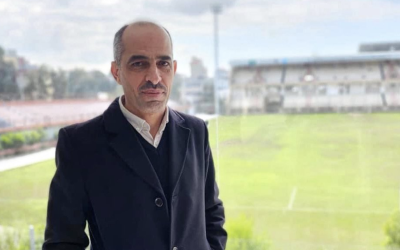
Later in the day, a second strike on a car about 11km from the border and near the southern Lebanese city of Sour killed four people, Lebanon's state news agency reported.
Israel and Lebanon's Hezbollah have traded daily fire since the start of the war, raising fears of a wider regional conflict.
Earlier on Tuesday, an 80-year-old woman was killed and several family members, including children, were wounded in a strike on their home in the village of Kfarkela, further east along the border.
A source in the area's Marjayoun hospital told AFP on condition of anonymity that the woman's seven-year-old granddaughter was in a serious condition.
According to AFP, fighting in southern Lebanon has left at least 95 dead, the majority Hezbollah fighters, but also at least 14 civilians.
Israeli authorities say nine people have been killed on the Israeli side, including six soldiers.
Middle East Eye delivers independent and unrivalled coverage and analysis of the Middle East, North Africa and beyond. To learn more about republishing this content and the associated fees, please fill out this form. More about MEE can be found here.


